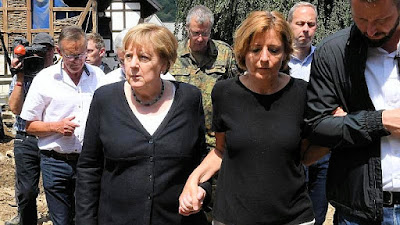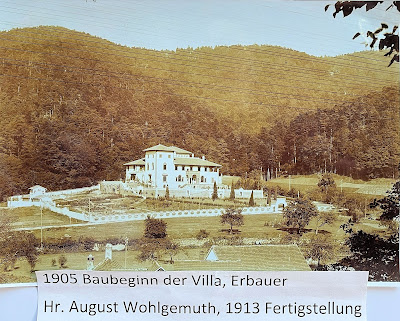Red Baron likes guided tours with a historical flair. From time to time, the
local newspaper Badische Zeitung offers those to its readers.
I
participated
in the last guided tour on Mach 11, 2020, before all social activities stopped due to the pandemic. I attended the
first one last week on July 8, 2021, following easing steps in Germany, given the presently low corona incidence rates.
I had not far to walk. The
tour, guided by
Detlev Fischer, a Professor emeritus and specialist in the history of law, took place in
Freiburg's suburb Wiehre, where I live.

|
The photo shows the guide and the participants keeping distances.
Instead of my cane, I had an umbrella on me (©Michael Bamberger/BZ) |
We
stood in front of several buildings where Freiburg law professors had
lived. These names do not mean much to a physicist, so I concentrated on the
historical context Professor Fischer deployed.
A central theme of the tour was the persecution of Jewish jurists under National Socialism. The Nazis did not even stop at respected professorial families.
Otto Lenel, a world-renowned expert on Roman law at Freiburg's University and honorary citizen, lived on 3 Holbeinstrasse. In 1933, he was already over 80 years old and emeritus, but his daughter, a nurse, lost her job due to her Jewish descent. Embittered, Lenel died in 1935. In 1940 the
Nazis deported his widow Luise at the age of 80, to the camp in Gurs. She died while still in transit.
The
antitrust lawyer and professor
Robert Liefmann lost his chair in 1933, remained in Freiburg,
and was deported to Gurs in 1940 too, where he died six months later. The
Gestapo, the Nazi Secret State Police, confiscated Liefmann's house on 33
Goethestraße and perfidiously used it for their purposes.
Then
we stood in front of the J
uristenvilla (jurist mansion) on Lugostraße, where
Fischer explained that four professors had lived there, some supporters, others
opponents of the Nazi regime.
When the name
Maunz fell, I suddenly was wide awake. Maunz, that name hit a buried bell.
Our guide told us that
Theodor Maunz specialized in administrative law and had been a
keen adherent of the Nazi regime throughout his career. When I remarked that the Nazi government had eliminated existing federal and local organizational structures from the beginning, Fischer nodded. The new rulers replaced these structures by
Gaue (districts) forced into line centrally. So it came as a
sort of surprise that in 1957 at the end of his academic career, Maunz became the Bavarian Minister of Culture.
Suddenly the
bell started to ring. Yes, I remember the name when I was busy with my doctoral thesis in Munich at the beginning of the sixties.
How could a man entangled in Germany's darkest past become a minister in the State of Bavaria after the war? I was perturbed and had a closer look at Maunz's biography.
Theodor Maunz was born in Dachau (!) near Munich in 1901. Following his law studies at Munich University, he
habilitated in 1932 and became a private lecturer at the law faculty for
German imperial, state, and local administrative law. After the National
Socialists' "seizure of power," he joined the NSDAP and the SA in 1933.
Maunz immediately chummed up with the new rulers when he wrote, "The idea that the purpose of administrative justice is to protect the sphere of freedom of the individual against measures of the state administration may have justification in the liberal state. In the National Socialist state, this must be eliminated."
Consequently,
Maunz was appointed full professor of law in Freiburg in 1937. He wrote in his
work
Administration, "The idea of separation of powers is a weakening of the
V
olksgemeinschaft (national community). It seemed to be the best guarantor of the idea of civil liberty. With the advent of a single bearer of the
Volksordnungs (people's order's) will and action, the separation and inhibition of
the powers are overcome ... Within the people's order, the powers are united
in the person of the leader; they have thus become a true total power, the
Führer's power."
Whoever thought that after the Second
World War, Maunz, as an old Nazi, would no longer be able to set foot in his trade was mistaken. He took part in the constitutional assembly to draft the new German constitution, the Basic Law, at Herrenchiemsee. Not only that, but he also
wrote the fundamental commentary on the Basic Law, together
with, among others, his student, the later Federal President
Roman Herzog.
When Maunz's Nazi
past gradually came to light, he resigned as Bavarian minister in 1966.
Only after he died in 1993 it came to light that Maunz, under a pseudonym, had still been writing
articles for the right-wing extremist Nationalzeitung.
In the same year, his former student Herzog stated, "Maunz was certainly one of the
dominant constitutional lawyers of the Federal Republic of Germany after
1948/49; one can also say that he helped shape the democratic constitutional
law of the Federal Republic."
How can a person
having rejected the separation of powers as a teaching professor suddenly become an advocate of one of
the bases of our constitution?
*









































